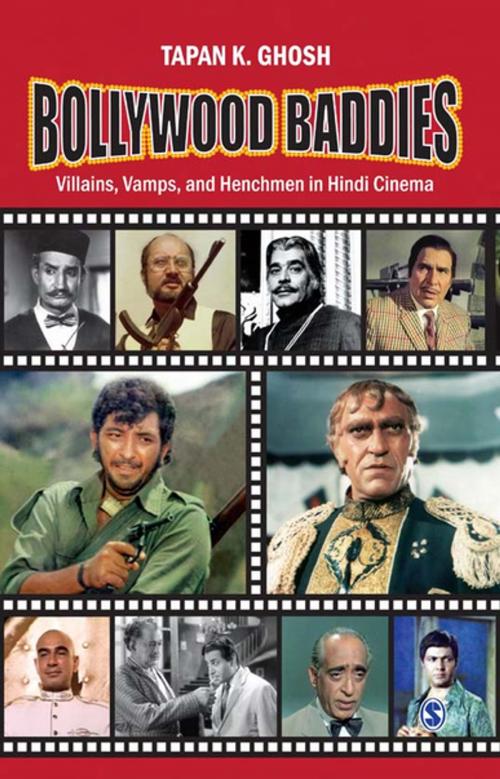Bollywood Baddies
Villains, Vamps and Henchmen in Hindi Cinema
Nonfiction, Reference & Language, Language Arts, Communication, Business & Finance, Industries & Professions, Industries| Author: | Tapan K Ghosh | ISBN: | 9788132115465 |
| Publisher: | SAGE Publications | Publication: | March 26, 2013 |
| Imprint: | Sage Publications Pvt. Ltd | Language: | English |
| Author: | Tapan K Ghosh |
| ISBN: | 9788132115465 |
| Publisher: | SAGE Publications |
| Publication: | March 26, 2013 |
| Imprint: | Sage Publications Pvt. Ltd |
| Language: | English |
Bollywood Baddies is the first-of-its-kind book-length narrative of villainy in Hindi films. It discusses villains, vamps, and henchmen of Bollywood cinema, and also the actors who essayed such characters over the decades. The author discusses not just villains but also the evaluation of villainous characters vis-à-vis sociopolitical conditions in the country.
The narrative begins with Ashok Kumar's negative role in Kismet as early as 1943, and goes up to the Agneepath remake (2012), where Sanjay Dutt plays Kancha Cheena, earlier essayed by Danny Denzongpa in the original. In between, it discusses all major villains, from Lala Sukhiram (Mother India) to Gabbar (Sholay) to "Lion" Ajit (Kalicharan) to Mogambo (Mr. India), and many others. While keeping villains in the focus, it also discusses popular henchmen and vamps, like M B Shetty, Sharat Saxena, Nadira, Bindu, Helen, among others, to understand the dimension of the villains' empire. After all, it's our villains who make our protagonist the hero we all admire.
An engrossing read, this book is for every film buff.
Bollywood Baddies is the first-of-its-kind book-length narrative of villainy in Hindi films. It discusses villains, vamps, and henchmen of Bollywood cinema, and also the actors who essayed such characters over the decades. The author discusses not just villains but also the evaluation of villainous characters vis-à-vis sociopolitical conditions in the country.
The narrative begins with Ashok Kumar's negative role in Kismet as early as 1943, and goes up to the Agneepath remake (2012), where Sanjay Dutt plays Kancha Cheena, earlier essayed by Danny Denzongpa in the original. In between, it discusses all major villains, from Lala Sukhiram (Mother India) to Gabbar (Sholay) to "Lion" Ajit (Kalicharan) to Mogambo (Mr. India), and many others. While keeping villains in the focus, it also discusses popular henchmen and vamps, like M B Shetty, Sharat Saxena, Nadira, Bindu, Helen, among others, to understand the dimension of the villains' empire. After all, it's our villains who make our protagonist the hero we all admire.
An engrossing read, this book is for every film buff.















